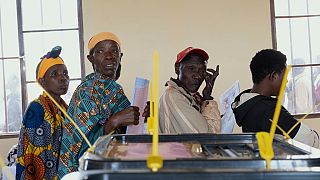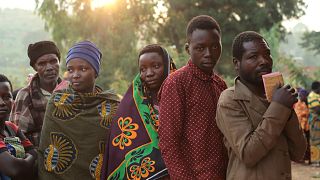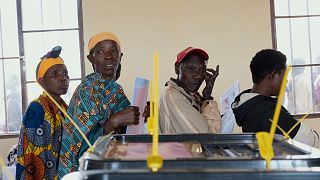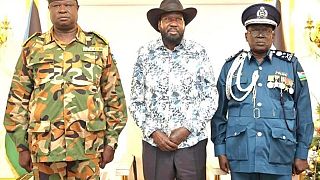Burundi
Farmers in a remote part of Burundi know to look for a truck parked by a highway when they want to sell their avocados.
They materialize from villages and form a crowd, watching closely as crews working for export companies in neighboring African countries weigh and load the crated fruits.
Such roadside exchanges, repeated regularly during peak harvest season, long provided a ready market for small-scale avocado growers in a country that’s sometimes ranked as the world’s poorest.
But the transactions now promise real earnings as well thanks in part to the intervention of the national government and farmers’ cooperatives that worked to set terms for foreign avocado dealers.
Just a year ago, farmers selling their avocados to the transporters earned 10 cents per kilogram (2.2 pounds), less than the price for small bottle of water. These days, farmers get roughly 70 cents for the same quantity, a meaningful increase for people who mainly farm to feed their families.
Another change: Payments in U.S. currency now go into the bank accounts of farmers’ cooperatives that pay their members directly almost as soon as the avocado haulers leave.
Acting as intermediaries, groups such as Green Gold Burundi, which has its headquarters in the northern province of Kayanza and represents 200,000 farmers nationwide, are better positioned than individual growers to ensure they are not getting exploited.
The participation of the cooperatives is an important step toward regulating the country's avocado exports, according to Ferdinand Habimana, vice president of Green Gold Burundi’s administrative board. Although Burundi President Évariste Ndayishimiye has described avocados as a way to diversify exports, there are no origin labeling requirements for the pear-shaped green fruits grown in Burundi.
“So it is legally done now, but what we are developing now is that the [avocados] can reach the final destination as avocados taken from Burundi,” said Habimana, speaking of his group’s dealings with exporters in Tanzania and elsewhere in the region.
Zacharie Munezero, who oversees quality management for Green Gold Burundi, acknowledged that the 70 cents farmers can earn for a kilogram of avocados is still too little when exporters can fetch between $3 and $5 for the same quantity in international markets.
Avocados are cheap in many parts of sub-Saharan Africa, where they can be purchased from farmers in bulk for almost nothing.
In Burundi, avocados became more widely cultivated after the country's late longtime leader, Pierre Nkurunziza, started extolling the fruit in 2007 as a source of nutrition and income.
Many households that don’t produce the varieties favored by exporters usually tend at least one avocado plant.
“Amavocat” is the word for avocado in the local language, and the large native variety of the fruit is called “amapeter” in remembrance of Nkurunziza, who died in 2020.
But while coffee and tea exports – Burundi’s traditional sources of much-needed foreign currency – have long been coordinated, the trade in Burundian avocados has remained unregulated, according to farmer representatives and a government trade official.
They argue that avocado exports could be as profitable for the country as coffee if the government asserted its rule-making authority.
Desirable measures include guaranteeing a minimum price for farmers, stopping foreign traders from dealing directly with farmers, and encouraging widespread cultivation of the Hass avocados favored by European consumers, they said.
Burundi “cannot rely only on coffee and tea,” Onesime Niyukuri, an adviser in the foreign trade department of the Ministry of Foreign Affairs, said of Burundi’s limited exports.
If avocado dealers from elsewhere in East Africa “can come and buy at a price that is already set by the government, there is no problem,” he said.
The government intensified its efforts to organize avocado exports earlier this year as dollar shortages fueled sporadic shortages of sugar and other goods.
Under new regulations, which require foreign dealers to register with local authorities, exporters must submit copies of their supply contracts and specify market destinations for Burundian avocados, according to the Ministry of Trade.
Burundi aims to export more than 10 million tonnes (11 million tons) of avocados each year by 2030, said Niyukuri, citing the government’s strategic plan. Recent figures on Burundi’s foreign exchange earnings from the avocado crop were not readily available.
The government’s target is to plant 50,000 avocado trees in each of Burundi’s 17 provinces, in addition to 10 million trees of traditional varieties already planted across the country.
Local authorities in provinces such as Kayanza want each household to own at least 10 trees growing exportable avocados.
That includes the Mexican variety Fuerte and, especially, Hass, first grown in California in 1926 and now the most commercially successful avocado variety globally.
Hass avocados, which have dark bumpy skins and bright yellow-green flesh, take more than two weeks to ripen and can survive several days in transit.
The variety is also known to be highly productive, with some trees bearing up to a tonne (1.1 ton) of avocados during the August to December harvest season, farmers said.
Burundi, a small mountainous country about the size of Maryland, is home to 13 million people.
Annual income per capita was $199 in 2023, among the lowest globally, and nearly 65% of the people live below the poverty line, according to World Bank figures.
Agriculture is the main economic activity, and many people in rural provinces such as Kayanza only grow the potatoes and vegetables they will consume through the year.
For many, including those with only a couple of plants in their compounds, avocado farming has proven a surprisingly reliable source of income.
Eric Nsabimana, a farmer in Kayanza, recalled starting as an avocado grower in response to the campaign of former leader Nkurunziza.
Some farmers felt forced into producing avocados and eventually uprooted the seedlings the government gave them but now rue the missed opportunity, Nsabimana said.
“The people who didn’t plant, they regret,” he said, adding that avocado “can change your livelihood.”
Nsabimana, who has made more than $6,000 selling avocados in some years, said he used his earnings to acquire five more hectares (12.4 acres) of land now planted with 500 avocado plants.
Habimana, the senior official with Green Gold Burundi, said his group moved to mobilize avocado farmers for better rewards after it realized at the beginning of the year they were being taken advantage of by foreign produce traders.
One day in January, he followed a truck transporting Burundian avocados to neighboring Tanzania.
He and others assumed the cargo was destined for consumption there.
When he saw the avocados getting washed, weighed and packed in the town of Njombe, he realized the goods were bound for another export market abroad.
“There was another destination somewhere else not in Njombe,” Nsabimana said.
When he returned to Kayanza, Green Gold Burundi prioritized plans to register avocado farmers in a way that eliminated middlemen and guaranteed a reasonable price for farmers.
The cooperative pays the applicable taxes and keeps a cut of avocado proceeds to maintain an office and to provide members with benefits such as free seedlings and organic manure.
Munezero, the cooperative's quality management official, said while the price “is still a problem,” his group is “focusing on capacity building" and encouraging residents to plant more avocado plants. Green Gold Burundi has distributed millions of seedlings in the past year, finding enthusiasm among farmers eager to join the avocado bandwagon.
Even growers with only a few backyard Hass plants said they increasingly see avocado as a cash crop.
“Avocados mean dollars to us,” one such grower, Samuel Niyinyibutsa, said, adding that he knows some Kayanza residents who feel “left behind” when they see others collect payments for their produce.
“But they still have time,” Niyinyibutsa said. “they can be awakened and start planting avocados because avocado can do well to them as it is doing well to us.”












01:45
Empowering youth in agriculture could boost global economy, FAO report says
02:08
Gunman attack in north-central Nigeria: death toll climbs to 150
11:14
Rwanda Walks Away: what’s behind the Central Africa rift? [Business Africa]
Go to video
World Bee Day: bees under threat, but solutions exist, report finds
Go to video
Indonesia hosts prestigious specialty coffee event for first time
01:58
Nigerian farmers struggle as climate change dries up water sources